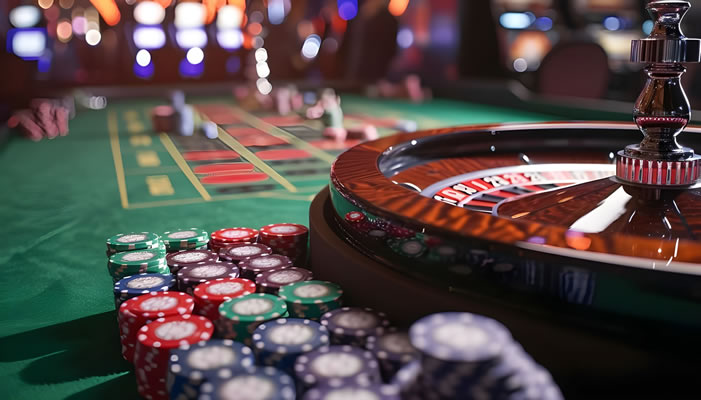The attraction of the jackpot is incredibly powerful that individuals across different backgrounds are drawn to it. It presents a nearly irresistible pull comes from the chance of winning a large sum of money through gaming at casinos, playing lotteries, or playing games of chance. For millions of people around the world, the idea of becoming wealthy and financially independent in an instant is an alluring one. Numerous psychological factors contribute to the jackpot's allure.
Main Points
- Why jackpots captivate us: The thrill of winning big draws people in due to the potential for transformative gains.Dopamine and the jackpot effect: Our brain's reaction to potential rewards, such as winning a jackpot, is fueled by the release of dopamine, creating a sense of pleasure and motivation.The role of risk and reward: The attraction to jackpots stems from the combination of risk with the possibility of reward, engaging the brain’s reward circuits.Optimism and hope in jackpot pursuits: The possibility of winning big impacts our mindset, fostering feelings of hope and positive expectation for the future.Social and cultural influences: Our attraction to jackpots is shaped by societal values, cultural norms, and social influences.

The possibility of striking it rich offers the promise of a thrilling new life free from the routine of day-to-day living. Lots of individuals are driven to pursue the ultimate jackpot prize because they find great resonance in the concept of taking a risk & possibly emerging victorious. The thrill of placing a huge bet or the suspense of waiting for the lottery results are just two examples of how people are drawn to jackpots because they represent human nature's need for excitement and risk. Dopamine's Role in Anticipating Wins. Dopamine is critical in our draw to jackpots, which is why jackpots are irresistible.
A neurotransmitter called dopamine is produced in reaction to pleasurable experiences like eating delicious food, engaging in fun activities, and yes, winning big. Dopamine is essential in the brain's reward circuits. Our brains release dopamine when we expect a possible reward, like winning the lottery, which makes us feel good and pushes us to seek more rewards. The Dopamine-Propelled Chase of Massive Victories. There’s a powerful drive to look for chances for large wins by the strong psychological pull that is fueled by dopamine production in response to potential gains.
The possibility of winning a massive prize floods the brain with dopamine, which creates a rush of euphoria and excitement. It is this dopamine-driven reaction to possible rewards that fuels our craving to take risks in the hopes of landing a big win & pulls us towards jackpots. The dark side of dopamine: the dark side of dopamine. The brain floods dopamine when we anticipate a big win, which can cause addiction-like excitement of excitement and anticipation. Gambling addiction often stems from this, which can be explained by the role dopamine plays in attracting us to jackpots. A powerful psychological force that can result in compulsive behavior & a loss of self-control is created when dopamine is released in response to potential rewards.
Humans' innate drive for risk is strongly linked to the allure of the lottery. The possibility of striking it rich is a high-stakes game that appeals to our deep need for risk and excitement. Our attraction to jackpots is fueled by the risk and excitement that comes with chasing large wins. Many people are motivated by the idea of taking a risk and possibly hitting it big, which pushes them to take chances in the hopes of claiming the grand prize. Humankind’s history as early humans may also provide insight into the role that risk and reward play in our fascination with jackpots.
Risk-taking was essential for survival throughout our evolutionary past because it frequently meant the difference between obtaining essential resources and going without. This behavior became beneficial in securing resources, it is ingrained in our brains to look for opportunities with high rewards. This natural inclination for risk still shapes our actions today, leading us to chase jackpots and urging us to take more risks in the hopes of hitting big.
Risk and reward drive our pull to jackpots, which connects with our craving for freedom and control over our own lives. The chance to become wealthy presents an opportunity for limitless living and according to one's own terms. The prospect of taking a chance and possibly making huge gains appeals to our desire for control and personal agency, which drives us to chase big rewards in the quest for financial freedom. A huge part of jackpot allure is the psychology of optimism & hope. The chance for a massive win provides a ray of hope for a brighter future, which fuels our ambition and drives us to go after big wins.

We are energized by hope and we are motivated to pursue big wins despite the odds because we believe in the possibility of winning big. This feeling of anticipation can create addiction-like behaviors. We take risks in search of financial security because we have an unshakeable sense of hope that one fortunate break could change our future. The influence of optimism & hope on our thinking regarding jackpots also relates to our deep desire for control of our life choices. Hope powers us forward by the possibility of winning big, which inspires us to take risks in the search for financial freedom and freedom from financial constraints. It is impossible to overestimate the influence of social & cultural factors on our attraction to jackpots.
We are bombarded with messages that strengthen the allure of striking it rich, with media portrayals of sudden wealth to societal norms to attain financial success. Our attitudes toward chasing large wins are shaped by the ubiquitous influence of social and cultural factors, which fuel our jackpot addiction and spur us to take chances in the quest for financial security. Social pressure and cultural expectations are just two more examples of how cultural pressures shape our attraction to jackpots. Chasing big wins is regarded as an desirable, Click here for info glitzy, and thrilling endeavor in various social groups.
People may chase large wins in an effort to gain validation or validation from others by feeling pressured to match the success of peers or coworkers who have made money through gambling. Our innate need for status is further evidenced by the societal influences on our attraction to jackpots. What draws us to jackpots and encourages us to take chances in the hopes of winning big is the possibility of becoming wealthy and well-recognized, which can boost our status. The Addictive Nature of Jackpot Pursuits. Dopamine's influence on big wins can create a dangerous cycle that causes individuals to take on more risk in the hopes of hitting it big, frequently at great personal expense.
The act of chasing losses can create a detrimental cycle that could seriously impact an individual's financial stability and overall happiness. The Dark Side of the Jackpot: Mental Health and Relationships. Chasing huge wins can take a toll on relationships and mental health in addition to financial ruin. Gambling addicts frequently struggle with ever-growing debts & money problems, which can create anxiety, depressed, and hopeless.
In addition, gambling for jackpots can damage personal relationships, leading to isolation & isolated. Support and Awareness for Addicts. The dangers of chasing jackpots highlight that individuals struggling with addiction need compassion and support.
It is imperative that society recognize the risks of gambling and offers assistance to those in danger of addiction. By doing this, we can endeavor to establish a safer environment and more supportive for people who might be having trouble the lure of the big win. Create healthy gambling habits to help people manage the emotional impact of jackpot chasing.

Individuals can find alternatives to cope with stress without gambling by staying active, meditating, or finding enjoyable hobbies and pastimes. In conclusion, individuals of all backgrounds are drawn to the jackpot because of its irresistible attraction. The appeal of large wins is fueled by numerous mental triggers, ranging from the dopamine response in reaction to potential gains to our innate desire for risk and reward. However, in order to prevent developing compulsive gambling behavior patterns, people should be aware of the possible risks involved in jackpot pursuits and adopt healthy habits for managing the emotional effects.
People can experience the excitement of chasing large wins without giving in to the negative effects of compulsive gambling behavior by comprehending the psychology underlying our attraction to jackpots & cultivating responsible, responsible gambling behaviors.
FAQs
Why are we drawn to huge jackpots?
Our interest in large jackpots stems from the brain's reward system. When we think about winning big, our brains release dopamine, a neurotransmitter linked to joy and reward-seeking. This dopamine release creates a feeling of excitement and creates hope, which can be highly addictive.
What keeps people playing after they lose?
People continue to play for jackpots even after experiencing losses because of the phenomenon known as "near-miss" experiences. When players almost win, it creates a dopamine boost similar to that of a real win. This near-miss experience fuels hope and encourage continued play, even when they’ve lost before.
How does social pressure fuel jackpot attraction?
Social influence plays a significant role in our craving for jackpots. The visibility of jackpot winners in the public eye and among friends builds social validation, leading individuals to think winning is possible and worth pursuing. On top of that, the excitement and celebration surrounding jackpot wins can influence others to start gambling.
What are the downsides of craving jackpots?
The attraction to winning big jackpots can have negative consequences, particularly when it becomes compulsive or addictive. Constant gambling in pursuit of jackpots can result in financial strain, relationship problems, and trigger emotional distress. Additionally, the craving for jackpots can lead to unrealistic expectations and a distorted perception of probability.
What are healthy ways to handle jackpot attraction?
Individuals can manage their attraction to winning big jackpots with smart strategies by setting limits on their gambling behavior, gambling responsibly, and seeking support if they feel their attraction to jackpots is becoming problematic. It's important to keep gambling in perspective and enjoy it for fun over the pursuit of large wins.